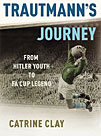 From Hitler Youth to FA Cup Legend
From Hitler Youth to FA Cup Legend
by Catrine Clay
Yellow Jersey, £16.99
Reviewed by Mike Ticher
From WSC 279 May 2010
Bert Trautmann was born in the worst possible year for a 20th century German, 1923. At ten he was eligible for the Hitler Youth just as the Nazis came to power. At 17 he was ready for war. Most of his contemporaries did not make it to 25, let alone quiet retirement in Spain.
Almost any part of Trautmann’s life contains more than enough material for a sensational narrative: the terror of the Eastern Front; his rehabilitation as a prisoner of war in Lancashire; his unlikely career with Man City; his messy and tragic home life. Catrine Clay skates lightly over the football, which is a relief, as those chapters are shaky. The rest is gripping.
Much as been written about Trautmann. Alan Rowlands’ 1990 biography could hardly be bettered for the detail of his football life. John Ramsden analysed the goalkeeper’s symbolic role in postwar reconciliation in his 2006 study of English-German relations, Don’t Mention The War. Trautmann’s resolve to be the “good German” after his POW experience, to be always polite and appreciative (which meant conquering his filthy temper), perhaps persisted in his willingness to talk at length to Clay, as he had to Rowlands.
The account of his war and POW years is almost literally unbelievable, since it is told in such minute detail and with large slabs of dialogue. But you don’t have to accept that every word is remembered accurately to be carried away by the story and to warm to the central figure. The strongest part of the book, cemented by Clay’s close contact with the women in Trautmann’s life, is her picture of his private struggles.
Trautmann was hardened physically and mentally by his Nazi youth and by the war, in which he saw Ukrainian Jews massacred, among many other horrors. After he joined up, he saw his family in Bremen only once until he returned from Britain – as a different man – in 1949. Small wonder their relations were awkward.
England was little better. Trautmann fathered children to two young women, abandoning Marion (they were reconciled in 2001) and marrying Margaret. That lasted until 1971, when she taunted him by making Nazi salutes and shouting “Heil Hitler” at Christmas dinner.
Nor did he get much chance to savour his greatest football moment. After breaking his neck in City’s 1956 Cup final victory, he was encased in plaster from head to waist for six months and feared he would never play again. A month after the final, his six-year-old son John was killed by a car when he ran across the road to buy sweets.
It would hardly be surprising if Trautmann had become angry, bitter or psychologically damaged. Instead his enlightened treatment as a POW brought out a generous, brave and sentimental man, who quickly grew to love the English and was in turn adored by them. That capacity for forgiveness and reconciliation, as much as his courage and skill on the field, makes it easy to overlook his undoubted flaws. If ever a life deserved retelling from a new angle, it was surely his.